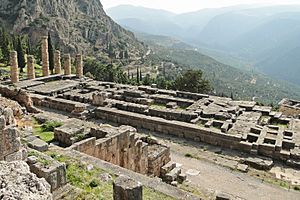Cleomenes II facts for kids
Quick facts for kids Cleomenes II |
|
|---|---|
| King of Sparta | |
| Reign | 370–309 BC |
| Predecessor | Agesipolis II |
| Successor | Areus I |
| Died | 309 BC |
| Issue | Acrotatus, Cleonymus |
| Greek | Κλεομένης |
| Dynasty | Agiad |
| Father | Cleombrotus I |
Cleomenes II (pronounced Klee-OH-men-eez; Greek: Κλεομένης) was a king of Sparta, an ancient Greek city-state. He ruled for a very long time, from 370 BC until his death in 309 BC. That's over 60 years!
Cleomenes was the second son of King Cleombrotus I. He was also the grandfather of Areus I, who became king after him. Even though he ruled for so long, we know surprisingly little about what he did. Historians have many ideas about why his reign seems so quiet, but no one is completely sure.
Contents
Life as a Spartan King
Cleomenes was part of the Agiad dynasty. This was one of the two main royal families in Sparta. The other was called the Eurypontids.
Family and Early Life
Cleomenes' father, King Cleombrotus I, died in a famous battle against Thebes in 371 BC. This battle was called the Battle of Leuctra. After his father's death, Cleomenes' older brother, Agesipolis II, became king. But Agesipolis II died very soon after, in 370 BC. That's when Cleomenes II became king.
A Long, Quiet Reign
Cleomenes II ruled for an amazing 60 years and 10 months. This information comes from an ancient historian named Diodorus of Sicily.
Even with such a long time on the throne, Cleomenes II didn't seem to do much that was recorded. Some modern historians have even called him a "nonentity," meaning he didn't stand out. The famous philosopher Aristotle wrote about how weak the kingship in Sparta seemed. He might have been thinking about Cleomenes when he wrote this.
Why was Cleomenes so quiet? Historians have a few ideas:
- Perhaps he focused on things happening inside Sparta, like local politics.
- Maybe the military duties were handled by kings from the other royal family, the Eurypontids. These kings included Agesilaus II, Archidamus III, and Agis III.
- Spartans were known for keeping their plans and policies secret from outsiders. This could explain why ancient writers didn't mention much about Cleomenes.
- It's also possible that his older son, Acrotatus I, took on many of the important tasks. Acrotatus was known as a military leader.
A Chariot Victory
We do know about one special event in Cleomenes' life. In 336 BC, he won a chariot race at the Pythian Games in Delphi. These games were a big deal in ancient Greece, similar to the Olympic Games.
Later that year, Cleomenes gave a small amount of money, 510 drachmas, to help rebuild the Temple of Apollo at Delphi. This temple had been damaged by an earthquake. He might have used this gift as an excuse to visit Delphi. This way, he could talk informally with leaders from other Greek states. They might have discussed what would happen after the recent killing of Macedonian King Philip II.
A King's Joke
A short, clever saying from Cleomenes has been saved in a book called the Moralia. This book was written by a philosopher named Plutarch. The story is about cockfighting:
Somebody promised to give to Cleomenes cocks that would die fighting, but he retorted, "No, don't, but give me those that kill fighting."
This means Cleomenes wanted strong, winning fighters, not ones that would just give up and die.
Who Came Next?
Cleomenes' older son, Acrotatus, died before his father did. So, when Cleomenes II passed away, his grandson Areus I became king. Areus was still very young at the time. Because of this, Cleomenes' second son, Cleonymus, acted as a regent. A regent is someone who rules for a young king until the king is old enough to rule by himself.
See also
 In Spanish: Cleómenes II para niños
In Spanish: Cleómenes II para niños
 | Jessica Watkins |
 | Robert Henry Lawrence Jr. |
 | Mae Jemison |
 | Sian Proctor |
 | Guion Bluford |


